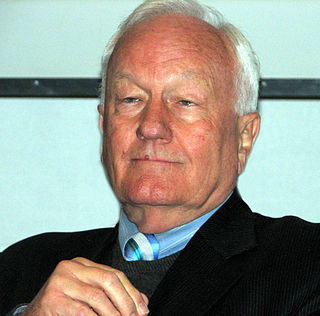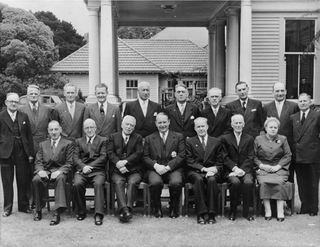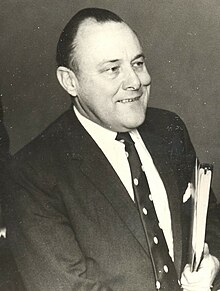In the United States, a 401(k) plan is an employer-sponsored, defined-contribution, personal pension (savings) account, as defined in subsection 401(k) of the U.S. Internal Revenue Code. Periodic employee contributions come directly out of their paychecks, and may be matched by the employer. This legal option is what makes 401(k) plans attractive to employees, and many employers offer this option to their (full-time) workers. 401(k) payable is a general ledger account that contains the amount of 401(k) plan pension payments that an employer has an obligation to remit to a pension plan administrator. This account is classified as a payroll liability, since the amount owed should be paid within one year.

A pension is a fund into which amounts are paid regularly during an individual's working career, and from which periodic payments are made to support the person's retirement from work. A pension may be:
A pension fund, also known as a superannuation fund in some countries, is any program, fund, or scheme which provides retirement income.

Sir Robert David Muldoon was a New Zealand politician who served as the 31st prime minister of New Zealand, from 1975 to 1984, while leader of the National Party.

Sir Roger Owen Douglas is a retired New Zealand politician who served as a minister in two Labour governments. He became best known for his prominent role in New Zealand's radical economic restructuring in the 1980s, when the Fourth Labour Government's economic policy became known as "Rogernomics".
A pay-as-you-earn tax (PAYE), or pay-as-you-go (PAYG) in Australia, is a withholding of taxes on income payments to employees. Amounts withheld are treated as advance payments of income tax due. They are refundable to the extent they exceed tax as determined on tax returns. PAYE may include withholding the employee portion of insurance contributions or similar social benefit taxes. In most countries, they are determined by employers but subject to government review. PAYE is deducted from each paycheck by the employer and must be remitted promptly to the government. Most countries refer to income tax withholding by other terms, including pay-as-you-go tax.

The 1975 New Zealand general election was held on 29 November to elect MPs to the 38th session of the New Zealand Parliament. It was the first general election in New Zealand where 18- to 20-year-olds and all permanent residents of New Zealand were eligible to vote, although only citizens were able to be elected.
Pensions in the United Kingdom, whereby United Kingdom tax payers have some of their wages deducted to save for retirement, can be categorised into three major divisions - state, occupational and personal pensions.
Superannuation in Australia or "super" is a savings system for workplace pensions in retirement. It involves money earned by an employee being placed into an investment fund to be made legally available to fund members upon retirement. Employers make compulsory payments to these funds at a proportion of their employee's wages. From July 2023, the mandatory minimum "guarantee" contribution is 11%, rising to 12% from 2025. The superannuation guarantee was introduced by the Hawke government to promote self-funded retirement savings, reducing reliance on a publicly funded pension system. Legislation to support the introduction of the superannuation guarantee was passed by the Keating Government in 1992.

KiwiSaver is a New Zealand savings scheme which has been operating since 2 July 2007. Participants can normally access their KiwiSaver funds only after the age of 65, but can withdraw them earlier in certain limited circumstances, for example if undergoing significant financial hardship or to use a deposit for a first home.

Social welfare has long been an important part of New Zealand society and a significant political issue. It is concerned with the provision by the state of benefits and services. Together with fiscal welfare and occupational welfare, it makes up the social policy of New Zealand. Social welfare is mostly funded through general taxation. Since the 1980s welfare has been provided on the basis of need; the exception is universal superannuation.

The Third National Government of New Zealand was the government of New Zealand from 1975 to 1984. It was an economically conservative government that aimed to preserve the Keynesian economic system established by the First Labour government and was also socially conservative. Throughout its three terms it was led by Robert Muldoon, a populist but antagonistic politician who was sometimes described as the National Party's best asset and worst liability.

The Third Labour Government of New Zealand was the government of New Zealand from 1972 to 1975. During its time in office, it carried out a wide range of reforms in areas such as overseas trade, farming, public works, energy generation, local government, health, the arts, sport and recreation, regional development, environmental protection, education, housing, and social welfare. Māori also benefited from revisions to the laws relating to land, together with a significant increase in a Māori and Island Affairs building programme. In addition, the government encouraged biculturalism and a sense of New Zealand identity. However, the government damaged relations between Pākehā and Pasifika New Zealanders by instituting the Dawn Raids on alleged overstayers from the Pacific Islands; the raids have been described as "the most blatantly racist attack on Pacific peoples by the New Zealand government in New Zealand’s history". The government lasted for one term before being defeated a year after the death of its popular leader, Norman Kirk.

The Second Labour Government of New Zealand was the government of New Zealand from 1957 to 1960. It was most notable for raising taxes on alcohol, cigarettes and petrol, a move which was probably responsible for the government lasting for only one term. It was headed by the Prime Minister Walter Nash.
A Personal Retirement Savings Account (PRSA) is a type of savings account introduced to the Irish market in 2003. In an attempt to increase pension coverage, the Pensions Board introduced a retirement savings account, that would entice the lower paid and self-employed to start making some pension provision. The intention was for PRSAs to supplement any State Retirement Benefits that would be payable in years to come.
The Fifth National Government of New Zealand was the government of New Zealand for three parliamentary terms from 19 November 2008 to 26 October 2017. John Key served as National Leader and Prime Minister until December 2016, after which Bill English assumed the premiership until the National Government's defeat following the October 2017 government-forming negotiations.

Wage theft is the failing to pay wages or provide employee benefits owed to an employee by contract or law. It can be conducted by employers in various ways, among them failing to pay overtime; violating minimum-wage laws; the misclassification of employees as independent contractors; illegal deductions in pay; forcing employees to work "off the clock", not paying annual leave or holiday entitlements, or simply not paying an employee at all.

The "Dancing Cossacks" was a 1975 electoral television advertisement for the New Zealand National Party, produced by advertising agency Colenso. The first half of the advertisement was animated by Hanna-Barbera, with the second half featuring National Party leader Robert Muldoon. The advert was produced to be highly critical of the governing New Zealand Labour Party's recently introduced compulsory superannuation scheme, implying the scheme would eventually turn New Zealand into a Soviet-style communist state, and urged people to vote for National in the upcoming general election.
Indian tax forms are used to document information in compliance with the Income Tax Act of 1961 and in accordance with the Income Tax Rules, which govern the process of filing income tax returns in India.
Rex Elliott Jones is a New Zealand trade unionist.












